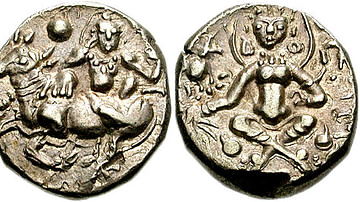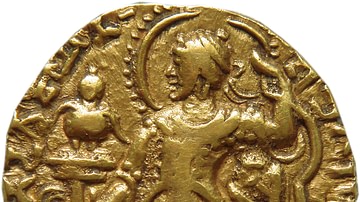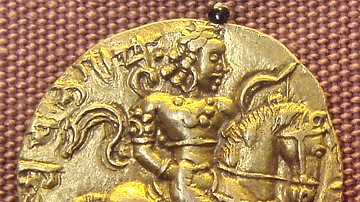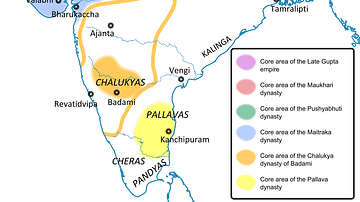Search
Search Results

Definition
Gupta Architecture
The Gupta Dynasty (4th-6th century) in North Central India saw the first purpose-built Hindu (and also Buddhist) temples which evolved from the earlier tradition of rock-cut shrines. Adorned with towers and elaborate carvings, these temples...

Definition
Gupta Empire
The Gupta Empire stretched across northern, central and parts of southern India between c. 320 and 550 CE. The period is noted for its achievements in the arts, architecture, sciences, religion, and philosophy. Chandragupta I (320 – 335 CE...

Definition
Gauda Kingdom
The Gauda Kingdom came into being in the late 6th century CE in eastern India, as a result of the political disintegration of the Gupta Empire (3rd-6th century CE). Its core areas were situated in what is now the state of Bengal in India...

Definition
Samudragupta
Samudragupta (r. 335/350 - 370/380 CE) was the first significant ruler of the Gupta Dynasty. Having come to the throne, he decided to extend the boundaries of his empire to cover the multiple kingdoms and republics that existed outside its...

Image
Gupta Dynasty India, 320 - c. 550 CE - From Magadha to Empire: Culture and Conquest in Classical India
This map illustrates the rise and territorial expansion of the Gupta Empire in India between 320 and circa 550 CE, showcasing a period often regarded as a golden age of Indian civilization. Originating from the Magadha region (modern Bihar...

Definition
Chandragupta II
Chandragupta II (c. 375 CE - 413/14 CE) was the next great Gupta emperor after his father Samudragupta (335/350 - 370/380 CE). He proved to be an able ruler and conqueror with many achievements to his credit. He came to be known by his title...

Definition
Maukhari Dynasty
The Maukharis (554 CE - 606 CE) rose as a power after the downfall of the Gupta Empire (3rd to 6th century CE) in the 6th century CE in northern India. The core area of their kingdom was situated in what is now the state of Uttar Pradesh...

Definition
Pushyabhuti Dynasty
The Pushyabhuti Dynasty (c. 500 CE - 647 CE) rose after the downfall of the Gupta Empire (3rd century CE - 6th century CE) in the 6th century CE in northern India. Also known as the Vardhana or Pushpabhuti Dynasty, the core area of their...

Definition
Tang Dynasty
The Tang Dynasty (618-907 CE) was one of the greatest in Imperial Chinese history. It was a golden age of reform and cultural advancement which lay the foundation for policies which are still observed in China today. The second emperor, Taizong...

Definition
Shang Dynasty
The Shang Dynasty (c. 1600-1046 BCE) was the second dynasty of China, which succeeded the Xia Dynasty (c. 2070-1600 BCE) after the overthrow of the Xia tyrant Jie by the Shang leader, Tang. Since many historians question whether the Xia Dynasty...